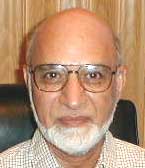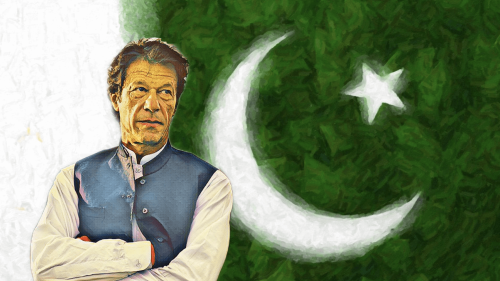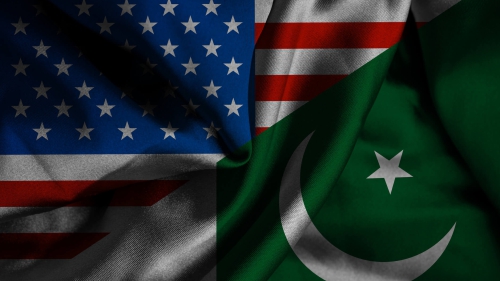Pakistan's Leaders Are to Blame for Problems
|
|
Pakistan came into being by virtue of the struggles by Muslims of the Indian subcontinent to maintain and strengthen their distinct Islamic identity. Muslims ruled India for nearly one thousand years and then lost their leadership position but were at the forefront of opposition and resistance against the British colonial rule that lasted for approximately 200 years. Their persistent confrontations with the colonial rulers resulted in the shift of power balance in favor of the Hindu majority. This made them realize that if they remained even after achieving political independence, they would remain deprived of their ideological goals.
The Pakistan movement was based not on color or race, but on Islamic faith. This was clearly stated by the leader of the independence movement, Mohammad Ali Jinnah, the Quaid-e-Azam (the Great Leader) in several addresses. As for example, at the world- famous Muslim University, Aligarh on March 8, 1944 he announced:
| _______
But Pakistan's ideological foundations were endangered by secularists who...promoted their self-interest and looted the resources of the country to fill their coffers and benefit their cronies. ________ |
"Tawheed (i.e., the Principle of Unity of Allah) - neither country nor race - is the basis of Muslims' nationality. When the first native of India became a Muslim, he no longer remained a member of the nation he belonged to but became a member of another distinct nation. Have you noted what was the motivation behind the demand for Pakistan? Neither Hindus' narrow-mindedness nor the British scheme - it was a basic demand of Islam."
Despite secularists claims to the contrary, the above-noted assertions constitute irrefutable facts of history. An independent Muslim state was finally realized on the 27th day of Ramadan, 1947.
But Pakistan's ideological foundations were endangered by secularists who had no role in the Pakistan movement but soon came to hold its reins of power. They promoted their self-interest and looted the resources of the country to fill their coffers and benefit their cronies. These persons now have the audacity to assert that Iqbal and Jinnah wanted to establish a secular state, and it is the religious extremists who wish to turn Pakistan into a theocratic state and take it back to "medieval times".
But the 54-year old history of Pakistan is a witness to the fact that it is the secular leadership that has most harmed the country. It was, and continues to be the cause for its weaknesses and failures. These secular groups have imposed themselves on the country in the form of politicians, in the guise of bureaucrats and in the garb of military rulers. On the other hand, it is the genuine religious leaders who have reined them in and struggled for the rights of the people. It is the Islamists who worked for protection of basic human rights and freedoms, strengthening of national security and restoration of democracy.
Secularism by itself has no vision for the individual, society or humanity for a better world. Today, secularism serves as a tool for establishing global domination by the West. Globalization as advanced by the West has not only its economic-exploitative and political-hegemony goals but also their ideological agenda. In the Muslim world, it also undermines state institutions in the guise of non-government organizations (NGOs). The promotion of secularism in Muslim lands is meant to divide the people and cause conflicts among them, because even through much word play and trickery, it cannot replace Islam, which is deeply ingrained in the Muslim psyche. Indeed, advocates of secularism, consciously or unconsciously, play the role of agents of Western colonialism in the Muslim world.
Therefore, the secular class must desist from trying to make controversial what is already agreed upon as consensus of the Pakistani nation. Pursuing such a divisive course would create confusion among people at a time when what is needed is to organize and galvanize masses for the positive constructive purposes.
Consider as a prime example, the constitution that has been worked out over a long period of time and enjoys national consensus. But it has never been acted upon. Although successive governments took the oath to uphold it, yet each time they adopted a variety of evasive, hypocritical tactics to become disloyal to it.
The constitution of Islamic Republic of Pakistan is based on three major foundations. Islam is its fountainhead and its basic foundation is laid down in its Objectives Resolution and the Islamic provisions. The Objectives Resolution is not only a preamble to the constitution but also its operative clause. Articles 2 and 2A of the constitution determine the powers of the state and its ideological boundaries. Article 227 gives the principles and limits of law making. The articles pertaining to Council of Islamic Ideology and Federal Sharia Court establish a system of checks and balances. The chapter of guiding principles for policy provides guidance for governance in the light of Islam. The constitution sets separation of powers and independence of judiciary. It instructs that the entire legal system be brought into conformity with the Shariah, a destination that is not in sight even after 28 years of its provision. Articles 62 and 63 delineating the standards for leadership and oaths are like covenants with the Pakistani nation.
All this is part of the constitution and the Council of Islamic Ideology has provided instructions for every facet of life in more than 40 reports. If there has been a failure and obviously there is, it is because the political leadership - parliament, political parties and their leaders have ignored these provisions of the constitution.
As its second foundation, the constitution provides a system of parliamentary democracy and delineates the distribution of powers and the role and obligation of each and every institution. But neither the elections are held according to it nor the parliament plays its duly assigned role.
The constitution has as its third foundation - the federalism, with distribution of powers between the center and the provinces. Yet, neither the process of distribution of powers has taken place nor institutions established for strengthening its federalist provisions. Pakistani leadership is afflicted with a disease; concentration of powers at the top, and this has not only deprived the constituents of their due rights but also engendered and pro,moted separatist tendencies in the provinces. In the interest of progress and development of the country, it is imperative that these three essential foundations of the constitution are respected and enacted without any further delay.
The tragedy of Pakistan is that during its 54 years of existence it has been hijacked by its military rather than run by the representatives of its people. And even when civilian politicians got themselves elected, they imposed their personal decisions rather than working in consultation with the people. The real tragedy of the Muslim world is that persons at the helm consider themselves as embodying the ultimate wisdom, instead of depending on the people to run their country's affairs and safeguard their national interests. Thus, these leaders have adopted the path of dictatorship with abrogation of people's rights. The result is the nonexistence of any viable democratic and Islamic institution in the Muslim countries. To break this vicious cycle in Pakistan, it is imperative that a completely autonomous election commission constituted in the framework of articles 62 and 63 is instituted and fully empowered to carry out free and fair elections on scheduled time.
Pakistan's economic woes are not due to any lack of resources but the wrong economic policies, subservience to the World Bank and International Monetary Fund, which are both rife with corruption, misplaced priorities and economic mismanagement. The shortsighted, short-term strategy of borrowing and giving false assurances to the nation (and the current Musharraf regime is no exception) while going further down the debt burden must be abandoned. It needs to be substituted by farsighted, long-term radically new initiatives, which to start with must involve the often-promised cessation of loans, revamping the policy and setting nation-oriented realistic goals and include building self-confidence and self-dependence measures. National priorities should be set up with such vital areas as education and social development topping the list.
The urgent need of Pakistan is to transfer power through free and fair elections to a new, honest and capable leadership that is fully accountable to its people. This leadership should be made to abide by and work according to the demands of constitution. The need of the hour is to mobilize the Pakistani nation so that it is placed in charge of its own destiny and plays its due role in building the country according to its aspirations. Each and every individual Pakistani must pledge to carry out his or her responsibility, diligently and conscientiously so that the nation as a whole becomes fully conscious of its covenant with Allah to turn Pakistan into an ideal Islamic State.
_______________________________________
Dr. Siraj Mufti currently serves as an Islamic consultant for the Correctional Corporation of America in Arizona. Previously he worked as a research professor at the University of Arizona and a chaplain with the U.S. Department of Justice.


















